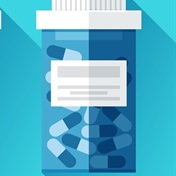People who use aspirin at least monthly have a significantly decreased risk of pancreatic cancer, according to a large case-control study presented at the annual meeting of the American Association for Cancer Research (AACR).
"We're not suggesting that people should start taking aspirin once a month to reduce their risk of pancreatic cancer," said researcher Dr Xiang-Lin Tan, from the Mayo Clinic in Rochester, Minnesota. "Rather, we think this study is a starting point for further research."
Studies on whether aspirin and other non-steroidal anti-inflammatory agents (NSAIDs) are potentially beneficial in preventing pancreatic cancer have had inconsistent results, Dr Tan noted.
In the current study, he and his team examined the association between aspirin, NSAID and acetaminophen use and the risk of pancreatic cancer. They compared 904 patients with pancreatic ductal adenocarcinoma and 1,224 healthy age and gender-matched controls.
All subjects were at least 55 years of age and reported their use of aspirin, NSAIDs and acetaminophen at ages 41 to 60 by questionnaire.
What the results showed
After adjusting for body mass index and smoking status (i.e., never, former, and current) the researchers found that people who used aspirin at least once a month had a 29% decreased risk of pancreatic cancer compared with those who did not take aspirin regularly (odds ratio 0.71, P = 0.0008).
Former smokers derived the greatest benefit from aspirin use (OR 0.61, P = 0.0008).
None of the other agents was linked with a decreased risk for pancreatic cancer.
"Aspirin and other NSAIDs have shown their antioxidant and anti-inflammatory properties and it is possible that this inverse association between aspirin use and pancreatic cancer is related to these properties," Dr Tan said. "However, the mechanism is still not well established and more laboratory studies are warranted."
"These findings are important to acknowledge when designing strategies for future chemoprevention studies," he added. "More data from additional studies must be gathered before we can prove a real benefit from this or any other potential therapeutic or preventative treatments."
(Reuters Health, Fran Lowry, April 2011)
Read more:




 Publications
Publications
 Partners
Partners














